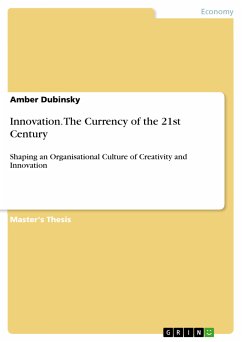Master's Thesis from the year 2013 in the subject Business economics - Business Ethics, Corporate Ethics, grade: 5.5 von 6 (Schweiz), Lucerne University of Applied Sciences and Arts (Betriebs- und Regionalökonomie IBR), language: English, abstract: This thesis aims at providing value to small and medium-sized enterprises (SME). In Switzerland these enterprises constitute 97% of all Swiss companies and employ 67% of the working population. These figures clearly demonstrate that SMEs are the backbone of the Swiss economy. Although the type of companies studied varied considerably in size, the concrete measures surfaced in the research that stimulate creativity and innovation are mostly size irrelevant. The belief that large corporations' ability to apply costly measures, would outplay SMEs proved to not necessarily hold true. This can be explained by the fact that organisational culture is predominantly about human interaction. It is about the people as they are the ones armed with great ideas. This study further reveals that these creative thoughts and ideas are frequently developed in a friendly atmosphere where people from different divisions can come together and exchange ideas. Creative hunches often occur through informal exchanges where work and social interactions are encouraged in everyday life. Therefore, not only places for "doing" need to be provided, but places for "being" are equally important. This human-centric orientation must be further supported by employee empowerment, trust and the freedom to take actions on behalf of the company. These values have a powerful impact on individuals and make them engage by means of intrinsic motivation. The synergy of these factors provides a lively melting pot where the communication culture promotes an honest exchange of opinions. This is considered as the most productive method in achieving great results. However, without the active role of management support, no such culture can be achieved. Impartially rewarding achievements, embracing uncertainty, allowing risk-taking and mistakes are prerequisites for innovation. Implementation of these factors may appear to be straightforward, however, it demands a high degree of letting go. These components must form an integral part of company strategies and are effective if they are not only clearly communicated throughout the entire workforce in a consistent manner, but also experienced and lived by employees in the daily operations and interactions. This clearly answers Drucker's question - "how much of innovation is inspiration, how much is hard work?" - and shows the great degree of influence that is held by management support.
Dieser Download kann aus rechtlichen Gründen nur mit Rechnungsadresse in A, B, BG, CY, CZ, D, DK, EW, E, FIN, F, GR, HR, H, IRL, I, LT, L, LR, M, NL, PL, P, R, S, SLO, SK ausgeliefert werden.









